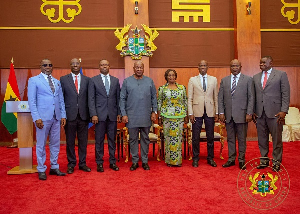A 10-YEAR Eurobond to give local, foreign and prospective investors the opportunity to buy and trade on the secondary market has been listed on the Ghana Stock Exchange.
Already listed on the Irish Stock Exchange in Dublin, institutional as well as local investors hold $16.5 million of the 2023 Eurobond.
Giving reasons for the listing, Finance Minister, Seth Terkper said it was meant to close the wide infrastructural gap, which constraints the country’s development efforts so it could tap into long-term financing options like the capital markets, both domestic and foreign.
He also indicated that as Ghana strengthened its middle income status, it would be practical to finance the capital component of the budget with long-term bonds. Currently, Ghana needs infrastructural financing gap to the tune of about $1.2 billion dollars a year.
It was for this reason that Mr Terkper said government had taken extensive measures to intensify the expansion of the corporate bond market. A well-developed bond market could help to mobilize funds to support capital expenditures.
Kofi Yamoah, Managing Director of Ghana Stock Exchange, in a remark, said the listing of the bond would deepen the bond market. It should also open the opportunity for the issue of longer dated and low rate bond to serve as a benchmark for the market.
Country Representative of Ecobank Development Corporation, Michael Cobblah, said the listing should open the avenue for the development and issue of corporate bonds on the market. He therefore called on government to encourage municipal assemblies to issue bonds for development.
Sam Mensah, Chairman of the Ghana Stock Exchange Council, commended the Stock Exchange for its remarkable performance and called for public support to list more bonds.
Ghana raised $1 billion from the international capital markets, attracting $750 million for cash with a maturity period of 10 years and a coupon rate of 7.875 per cent. This would be paid semi-annually.
Proceeds from the bond will go to financing counterpart funds for capital projects as well as financing capital expenditures approved in the 2013 Budget.
Other priority projects include self-financing ones such as the ports and power projects and the refinancing of public debt to reduce the cost of borrowing.
Business News of Sunday, 1 September 2013
Source: Daily Guide
Gov’t woos local, foreign investors













